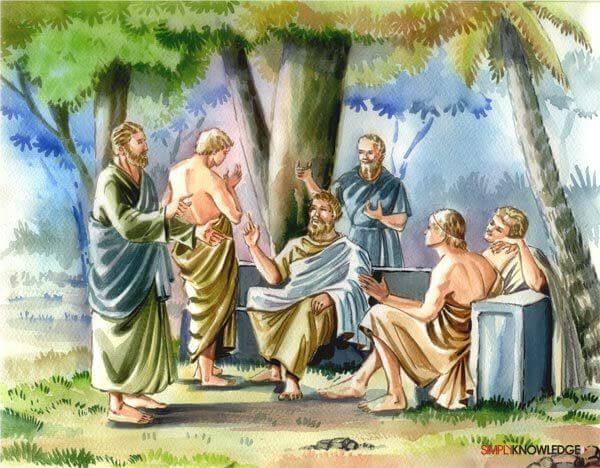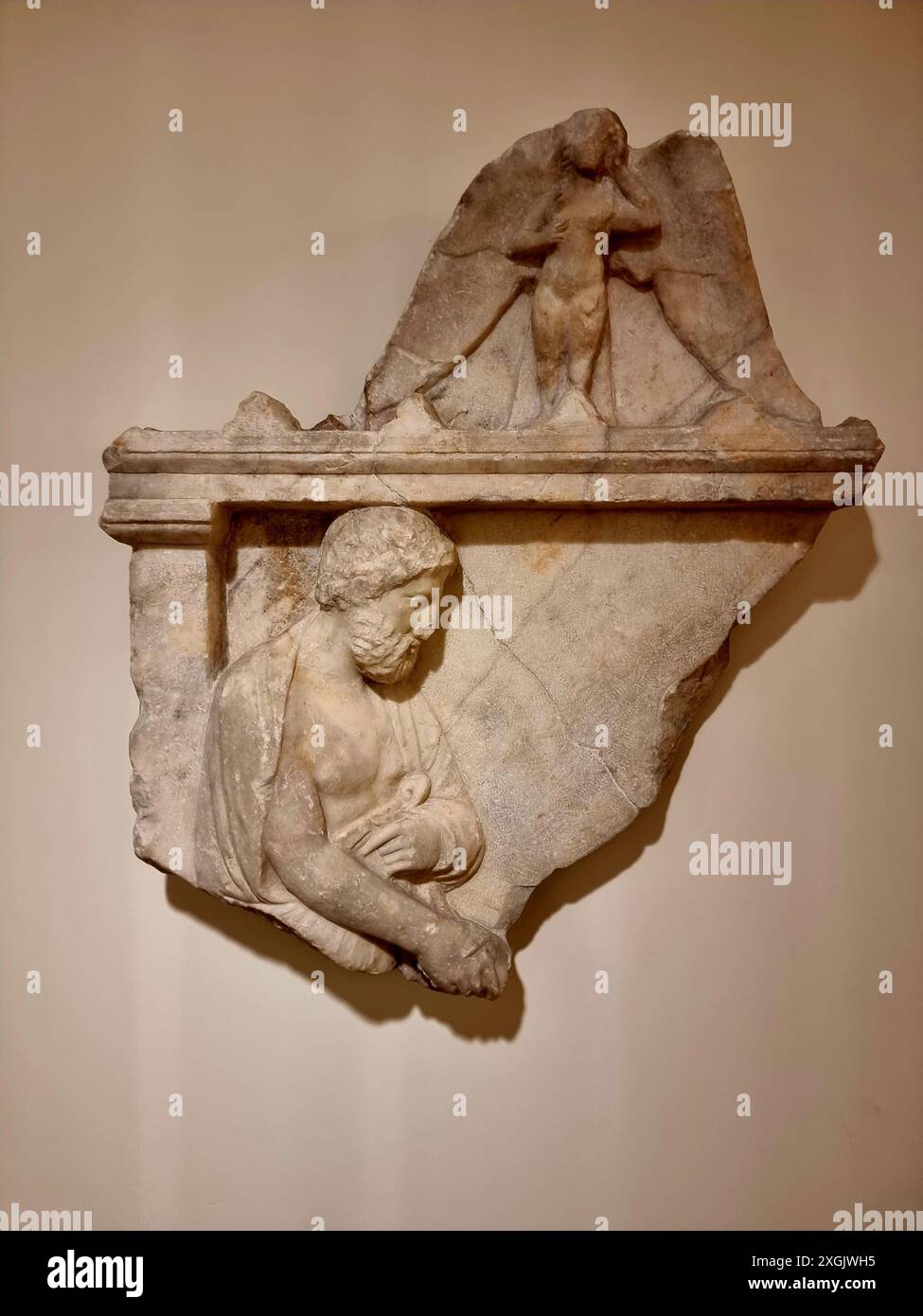The Enigmatic Figure of Hippias: Tyrant of Athens
Introduction
In the annals of ancient Greece, few figures are as polarizing and enigmatic as Hippias, one of the notorious tyrants of Athens. His rule, falling between the classical periods of Solon and the democratic reforms of Cleisthenes, marked a critical juncture in Athenian history. The life of Hippias serves as a lens through which we can examine the complexities of power, governance, and the inevitability of change in the ancient world. This article explores Hippias's rise to power, his reign as a tyrant, and his eventual downfall, while delving into the broader implications of his rule for Athenian society.
The Rise of Hippias
Hippias was born into the powerful Pisistratid family, son of Peisistratos, a notable figure who initially seized control of Athens in the mid-6th century BCE. Peisistratos is credited with laying the groundwork for a centralized power structure in Athens, although his methods often involved manipulation and force. Hippias was groomed under his father's tutelage to continue the lineage of leadership.
Following the death of Peisistratos around 527 BCE, Hippias ascended to power along with his brother, Hipparchus. Their co-rule was founded on the pillars established by their father: leveraging economic stability, fostering public works, and maintaining control over the aristocracy. Under their administration, Athens witnessed an era of relative peace and prosperity, despite the undercurrents of tyranny. The duo invested in substantial public projects, notably the expansion of the Acropolis, which served not only as a religious and cultural center but also as a testament to the ruling family's contributions to Athenian society.
Hippias's Reign: Benevolent Dictator or Harsh Tyrant?
The character of Hippias's rule is often subject to historical debate. Initial assessments by classical historians like Herodotus and Thucydides paint him as oppressive. However, others argue that he maintained several civic improvements, thus earning a degree of approval from various sectors of society.
Hippias's governance saw the expansion of infrastructure, including roads and temples, supporting a boom in economic activity and culture. Moreover, his rule marked the inception of some public festivals which would later play an essential role in developing Athenian identity. Hippias tried to present himself as a patron of the arts, courting poets and artists to embellish the cultural landscape of Athens.
However, beneath the surface of these advancements lay an atmosphere of fear and suspicion. Control was paramount for Hippias, who adeptly maneuvered to keep potential rivals, particularly the nobility, at bay. His methods, while effective in securing his rule, gradually alienated segments of the population. Where his father had wielded power with a combination of force and clever politics, Hippias leaned heavily on oppression, particularly after the assassination of his brother Hipparchus around 514 BCE. This tragedy marked a turning point for Hippias, who became increasingly paranoid and repressive.
The Downfall of Hippias
The assassination of Hipparchus sparked a change in Hippias, transitioning him from a ruler who balanced tyranny with benevolence to one who wielded power with a heavy hand. The murder was orchestrated by Harmodius and Aristogeiton, two lovers who believed they were avenging personal grievances against the ruling family. This event had profound psychological and social repercussions.
The climate of repression intensified under Hippias's solo rule. Fear and mistrust characterized his leadership, as he implemented strict measures to ensure his hold on power amidst threats and conspiracy rumors. Over time, the burden of tyranny became too much for the Athenians to bear, leading to internal unrest and the erosion of support among key social factions.
Eventually, external intervention facilitated the downfall of Hippias. The Alcmaeonid family, a powerful Athenian family exiled by the tyranny, along with support from King Cleomenes I of Sparta, mounted an effort to overthrow the Pisistratid regime. By 510 BCE, they successfully ousted Hippias, marking the end of his family's control over Athens.
The Legacy of Hippias
Understanding Hippias’s legacy requires a nuanced exploration of his impact on Athens. Despite his downfall, the infrastructure and policies implemented during his reign laid essential groundwork for future developments. The experience of tyranny under Hippias crucially informed the subsequent push towards democratic reforms led by Cleisthenes. This transition represented a significant shift in political philosophy, emphasizing the need for checks on power to prevent despotism.
In retrospect, the period of Hippias's tyranny is a valuable study in power dynamics and governance, illustrating how public sentiment, internal policies, and external pressures can converge to reshape a society fundamentally. His story is a stark reminder of how ambition, paranoia, and fear can unravel the potential for greatness, leaving enduring lessons on the importance of balance and justice in political leadership.
In the unfolding chapters of Athenian history, the legacy of Hippias stands as a pivotal moment—one that catalyzed change and eventually gave rise to a form of government that would influence the course of Western civilization for centuries to come.
The Political Climate and the Pisistratid Regime
To truly grasp the significance of Hippias's rule and its eventual collapse, one must consider the broader political climate of Athens during the late 6th century BCE. Prior to the emergence of the Pisistratids, Athens was plagued by the usual challenges of aristocratic dominance and social strife. The city-state was rife with factionalism, and the inequity between the wealthy aristocrats and impoverished citizens was stark. These dynamics created fertile ground for a figure like Peisistratos, Hippias's father, to assert control by bridging these divides, albeit temporarily.
Under the overarching influence of the Pisistratid regime, significant shifts manifested in Athenian society. Through their reign, Hippias and his predecessors implemented policies designed to maintain order and garner popular support. They leveraged public projects to provide employment and stimulate the economy, tactics borrowed and adapted from earlier rulers in other parts of the Greek world. However, these efforts were a double-edged sword, providing immediate relief while reinforcing an authoritarian grip on power.
The Role of Cultural and Religious Initiatives
A critical aspect of Hippias’s rule was his strategic use of cultural and religious initiatives to solidify his regime’s legitimacy. By understanding the profound spiritual connections within Athenian society, Hippias sought to associate his rule with divine favor. The sponsorship of religious festivals, which holds significant importance in the social and religious tapestry of Athens, was emphasized as an essential part of his strategy. One such event was the Panathenaic Festival, an auspicious celebration in honor of the goddess Athena, patron of the city. Through these acts, Hippias was able to project an image of piety and cultural patronage.
Beyond religion, the arts flourished under his reign. Patronage extended to poets, musicians, and artists who thrived in an environment that valued expression and creativity. These cultural investments reflect both the personal interests of Hippias and his awareness of the power of culture as a tool of governance. By cultivating these areas, he aimed to fortify his position as a benevolent ruler and distract from the more draconian aspects of his administration.
Legacy and Historical Interpretation
The story of Hippias, infused with elements of both benefaction and tyranny, is a testament to the dual nature of kingship during this period. His reign epitomizes the conceptual balancing act between implementing societal advancements and consolidating power. However, historical portrayal of Hippias varies widely based on the sources. Primary accounts like those of Herodotus offered judgmental views, often painting the tyrant in a primarily negative light. These historians lived during or shortly after the Athenian Golden Age, and their works were colored by a pro-democratic sentiment that inevitably tinged their records of Hippias’s tenure.
Contemporary historians often revisit such narratives, acknowledging their biases while seeking a more nuanced perspective. The role Hippias played in the broader narrative of Athenian evolution is re-examined with attention to the socio-political stability that briefly flourished amid his rule—even if such stability came at the cost of personal freedoms. Examining these elements aids in understanding how his policies indirectly accelerated Athen's shift toward democracy.
The Catalysts for Democratic Reform
The fall of Hippias and the establishment of democracy in Athens are intertwined in the narrative of Western political history. The expulsions of Hippias underscored the vulnerabilities inherent in tyrannical rule and sparked a societal drive for more equitable governance. The political vacuum left by his exile prompted the emergence of Cleisthenes as a reformer keen on restructuring Athenian society based on democratic principles.
Central to these changes was the reorganization of the political landscape, starting with the disbanding of traditional tribal loyalties that had previously formed a barrier to wide-scale civic unity. Cleisthenes's reforms promoted inclusivity and civic participation, crystallizing in the foundation of the Athenian democratic system that emphasized political equality. Hippias’s despotic reign, imbued with its lessons of how power could corrupt, acted as a compelling rationale for the establishment of checks on authority that would include citizen assemblies and a complex network of councils.
The tumultuous legacy of Hippias paradoxically forged a pathway towards democracy—a system that reverberated throughout the classical age and beyond. Without the excesses of his rule, it is challenging to measure how fervently the Athenians would have pursued their new form of government. The transitional period following Hippias’s exile illustrates an adaptive society choosing reform over regression. While tyranny was a lesson in the perils of unfettered power, the shift to democracy highlighted the potential for human governance to reflect the will of the people.
In conclusion, Hippias's impact on Athenian history and governance cannot be overlooked. His attempts to maintain power through culturally astute and economically advantageous measures juxtaposed with his later repressive tactics form an intricate tableau, rendering him as both a villain and a catalyst for change. As we continue to explore the multifaceted narrative of Hippias and his rule, we must acknowledge the paradoxes and dynamics that ultimately shaped a critical transformation in the political landscape of ancient Athens, setting a precedent for democratic governance that continues to inform contemporary political thought.
Hippias, the Exile: A Chapter Abroad
Following his expulsion from Athens in 510 BCE, Hippias's story did not conclude. Instead, it took on a new dimension as he embarked on a life of exile, a journey that further intertwined his legacy with the broader geopolitical dynamics of the region. Initially, Hippias retreated to the court of the Thessalian Aleuadae, a choice reflective of the interconnected political alliances typical of Greek aristocracy and the strategic need to forge new relationships that might support his ambitions for power.
Hippias's ultimate destination was what would become a conspicuous chapter of his life in Persia. It was during this time that he aligned with the Persian Empire, one of the most formidable forces of the age, which presented opportunities for a return to power in Athens. His move to the Persian court at Sardis marked a pivot in his quest, aligning with the administrative heartland of the empire under the magnanimous and strategic King Darius I. By offering himself as a valuable asset—complete with his knowledge of Athenian politics and military tactics—Hippias endeavored to become instrumental in Persian plans to expand their influence in Greece.
The Battle of Marathon: Hippias's Final Pursuit
The relationship between Persia and Hippias ushered in a decisive episode in Athenian history: the Persian Wars. Hippias's instigation and involvement were pivotal in the events leading up to the Battle of Marathon in 490 BCE. As part of Darius's campaign, Hippias envisioned a restoration of his rule over Athens through Persian victory and support, a familiar maneuver of exiled dynasts seeking foreign backing to reclaim lost thrones.
The Battle of Marathon, an iconic confrontation between the might of Persia and the agency of a nascent democracy, unfolded with audacious strategy on both sides. Despite being significantly outmatched in numbers, the Athenians secured an unexpected and resounding victory against the Persian forces. Hippias, likely in his seventies by this point, was reportedly present with the Persian armies, hoping to reclaim his lost heritage in the clutches of imperial triumph.
This Athenian triumph at Marathon was not just a military success but a profound psychological and political turning point. For the Persians, and by extension Hippias, it represented a rupture in their campaign of territorial expansion; for Athens, it was a reaffirmation of their democratic resolve and autonomy against forces aiming to subjugate and control. The defeat at Marathon effectively extinguished any lingering hopes Hippias might have harbored of a victorious return as tyrant of Athens.
The Impact on Athenian Identity and Greek Unity
The figures and events of this era left indelible marks on the Athenian psyche and identity, which would influence Greek culture for generations. Hippias's connection to the Persian aggression cemented his place as a symbol of foreign tyranny and a cautionary tale against the dangers of autocratic governance. The response to both the threat from Persia and tyranny at home led to a burgeoning sense of unity among the Greek city-states, albeit one characterized by competitive alliances more than solidarity.
The experiences garnered through opposing figures like Hippias allowed Athens to craft a robust narrative of their history, steeped in the valor of defending freedom against despotism. The ideological clash against Hippias's attempts to reconvene his rule under Persian auspices played into a grander mythos of Athens as the cradle of democracy, a fortress against subjugation that would later inspire cultural and civic pride throughout the Hellenic world.
Reflecting on the Lessons of History
As we reflect on the life and times of Hippias, the reflection is one of profound complexity that stretches beyond the annals of tyranny. His narrative embodies timeless themes of ambition, power, and the intricate dance of political machinations that shape civilizations. The oscillations between his initial achievements and subsequent downfalls offer nuanced insights into governance and the perennial dance of evolving societal structures.
The transformations in Athens post-Hippias also serve as benchmarks for political evolution—the lessons learned from his rule helping to underpin the rigorous pursuit of democracy and justice. His attempts to navigate and exploit the geopolitical tides of his era, while ultimately unsuccessful, echo the timeless human pursuit of power and legacy, a story well-ensconced within history's broader tapestry. Indeed, Hippias's life reminds us of the intricate intersect of personal ambition with the inexorable currents of historical change.
Ultimately, Hippias remains a compelling study of how individuals and events, through paths of resistance and acceptance, contribute richly to the unfolding drama of history. For Athens, and eventually the world, these experiences became the catalyst from which new thoughts and ideas sprung forth—shaping what would emerge as a dynamic and enduring civilization, remembering where it came from to illuminate a way forward for coming generations.













:focal(1134x648:1135x649)/https://tf-cmsv2-smithsonianmag-media.s3.amazonaws.com/filer_public/49/26/4926c5f7-b1c9-4b5c-842c-cfe6cdb13a1d/panoramica_1.jpg)
/regions/2024/10/25/perp-fort-de-bellegarde-eligigle-loto-patrimoine-00-00-05-14-671b586c997a2857374505.jpg)
Comments